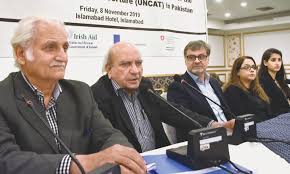Lack of political will stumbling block in way of anti torture legislation: Farhatullah Babar

Islamabad: Lack of political will is responsible for failure to enact anti torture legislation to end endemic torture in police stations, lock ups and military run internment centres.
This was stated by former Senator Farhatullah Babar at the HRCP national consultation on implementation of UN Convention against Torture in a local hotel in Islamabad.
He said that Pakistan signed CAT in 2008, ratified it in 2010 which made it obligatory to make domestic legislation but the same had not yet been done despite unanimous adoption of a private member Bill in March 2015 that was endorsed by the Ministry of Interior and all political parties and provinces.
He said that the present government had promised to immediately bring in anti torture legislation but failed and every time the matter is raised in the human rights committees of senate and national assembly the standard response of the government is that the draft bill is under consideration and will be presented before the cabinet at its next meeting but that next meeting has not yet come.
Farhatullah Babar said that it appeared that the stumbling block were the security agencies that did not want to be held accountable for torture and custodial death under their watch.
He referred to the brief submitted by the human rights ministry on December 12, 2018 which stated the clause in the Bill relating to armed forces had been deleted. He said that Article 19 of the Bill passed by the Senate which the human rights ministry wishes to delete reads:
“A state of war, threat of war, public emergency, internal political instability or an order of a superior authority or officer shall not constitute a defence against the commission of offences under this act”.
Farhatullah Babar asked as to why a clause in the Bill endorsed by the Human Rights Ministry in 2015 was being opposed by the same Ministry now in 2019.
The former Senator said that recognized places of detention under criminal laws are prisons, judicial and police lock ups but a new opaque detention centres called internment centres had been set up run by the military. While there were laws, howsoever, ineffective and poorly implemented, against torture at the legally recognized centres of detention the internment centres were beyond oversight and had become like Guantanamo By like prisons of Pakistan.
He said that the KP government recently promulgated to set up such centres not only in the erstwhile tribal areas but throughout the province. The move has since been challenged in the SC and it fixed for hearing on Wednesday next week, he said.
He said that any legislation should also cover other forms of Cruel, Inhuman and Degrading Treatment (CIDT) along with torture as required under the CAT. He also called for independent and impartial oversight of internment centres. The scope of the anti torture legislation should not only be limited to police but should also cover any ‘public official’.
The national consultation was also addressed by Senator Sherry Rehman and I. A Rehman. Senator Sherry Rehman dilated upon her anti torture Bill recently submitted to Senate secretariat. Mr I A Rehman talked about the role of civil society in advancing progressive legislation.
Later the HRCP also decided to form a working group of concerned citizens to carry forward the conversation on anti torture legislation in the country. The proposed Working Group will critically examine the proposed legislation being brought by the government and lobby with the members with Parliament and cross section of civil society to enact the anti torture legislation.





